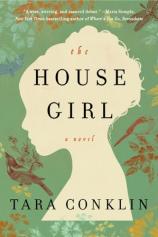The House Girl
Review
The House Girl
It is not often that I get the opportunity to read fiction presenting a dual perspective --- historical and legal --- of past injustices not yet addressed. THE HOUSE GIRL is a legalistic novel written by a New York litigator, now a fiction writer, who approaches the subject of slavery as a grievous, immoral practice and also a modern injustice that should create a legal basis for nationwide restitutions.
The novel plays out a little like a movie, being familiar for sweeping dramatic events that all center on a groundbreaking lawsuit, headed by an idealistic litigator who faces extreme challenges. Carolina Sparrow is this fictional attorney, a likable New Yorker whose creativity, perseverance, finesse and strong principles make her the perfect person to take on the case. The book brings to mind the film A Few Good Men.
"THE HOUSE GIRL is a thoughtful work of fiction about freedom, love, and the continued price for former slaves with modern descendants. Conklin creates a convincing case of an unrecognized injustice with a novel that is both legalistic and artistic."
Lina is first introduced as one of many devoted first-year associates in a large Manhattan law firm, forced to suck up to the right stuffy attorneys if she ever hopes to find a way to partnership. Her business and personal life play out in the foreground while she takes on this revolutionary case and meets the man who will become her plaintiff and dear friend.
Lina is privately challenged by her inability to accept and understand her own family’s complicated history; her home life presents some frustrating challenges, brought on by continued secrecy between her and her father, who share a small apartment where her dad works as an artist. Their complicated relationship seems muddled by a tendency toward dysfunctional grief after the death of Lina’s mother. But Lina begins to adjust to the truth and finds herself able to trust in love and find a man in which she can be confident.
Lina’s modern story alternates with a historical tale about a young woman who makes success possible for the reparations case. The woman’s descendant ultimately becomes the plaintiff, and this side story jumps back to the 1850s and to surviving records of her life. The experiences of a young woman named Josephine Bell are described in painstaking detail --- a Virginia artist and slave trying to escape a farm in Lynnhurst. During her enslavement, Josephine endures unthinkable suffering, which is sometimes very subtle, living with a “mistress” and “master” who understand little of their cruelty. Josephine is left with the hardships of giving birth to a child who was fathered forcefully and then taken from her. Her story ends with the comfort of a legacy she would surely be proud of.
An important element to Josephine’s story is the fact that she was an artist with incredible gifts that allowed the survival of her paintings, which gained national attention, although the credit for authorship was wrongly attributed to her white mistress. This injustice only adds to the many wrongs Josephine and her forbears endured, but Lina becomes determined to prove the authenticity of the artist, requiring her to fight against the owner --- a wealthy foundation with great power that has gone to great lengths to hide the evidence and ignore the truth.
Tara Conklin’s story suggests that U.S. industries and companies be made financially and socially responsible for profiting from slavery --- along with the U.S. government --- and for creating the longstanding social stratification and lack of official recognition by America for the immensity of what slaves endured. Ideally this restitution would be in the form of new programs, monuments and museums. The author stresses the many contributions slaves made to building America, suggesting that legal work is necessary to restore justice.
THE HOUSE GIRL is a thoughtful work of fiction about freedom, love, and the continued price for former slaves with modern descendants. Conklin creates a convincing case of an unrecognized injustice with a novel that is both legalistic and artistic. This is a story of personal and national identity that you won’t want to miss.
Reviewed by Melanie Smith on December 1, 2013
The House Girl
- Publication Date: February 12, 2013
- Genres: Fiction, Historical Fiction
- Hardcover: 384 pages
- Publisher: William Morrow
- ISBN-10: 0062207393
- ISBN-13: 9780062207395










